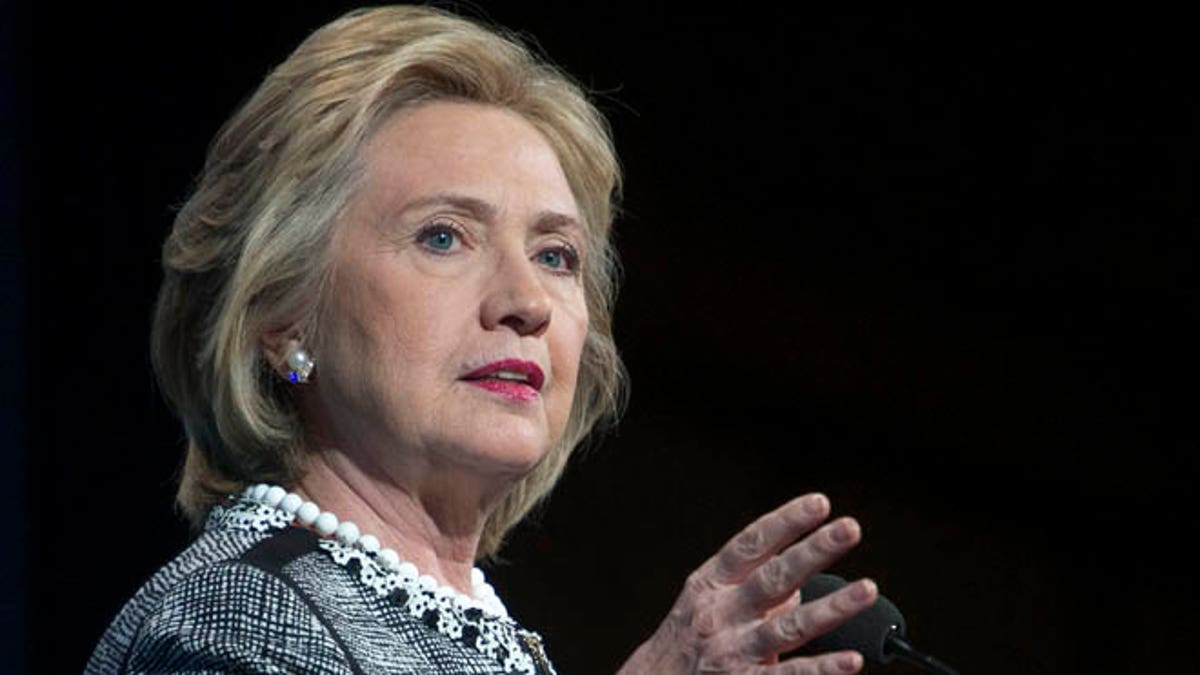
May 14, 2014: Former Secretary of State Hillary Clinton speaks in Washington. (AP)
You can blame the financial crisis for Great Britain’s shocking decision to leave the EU. Why? Because the Great Recession made ordinary people lose faith in “establishment” leaders.
The people of the UK were warned in apocalyptic terms of the risks of exiting the European Union; they heard from their political leaders, military chiefs, the directors of think tanks, central bankers and business leaders, all of whom warned of severe economic repercussions from “Brexit.” Even President Obama weighed in, delivering a stark threat that England on its own would fall to the “back of the queue” if it tried to negotiate trade deals with the U.S.
At the end, they didn’t care.
The citizens of the UK voted for “independence” from the bureaucrats of the EU, and for greater sovereignty over their own lives. They voted for more power over immigration levels and less kowtowing to Brussels. They voted against the elites who had gotten it so wrong in allowing the financial collapse of 2007. As Queen Elizabeth reportedly asked, “Why did nobody see it coming?”
A poll of UK voters by YouGov underscores the damage done by the credit crisis. They asked people if they trusted various groups; the results were shocking. Only 37 percent said they trusted the heads of well-known businesses, against 43 percent who did not. A mere 38 percent trusted economists, while 39 percent did not; and the Bank of England was trusted by 36 percent compared to 45 percent who did not.
The survey of those leaning towards a “leave” vote as compared to those likely to vote “stay” showed a clear schism: those favoring Brexit didn’t trust anybody. For example, while 55 percent of so-called “remainers” trusted the leaders of big business, only 27 percent of Brexiters had confidence in that group.
The citizens of the UK voted for “independence” from the bureaucrats of the EU, and for greater sovereignty over their own lives.
A great many people in the UK and elsewhere blame establishment business and political leaders for championing decades of globalization which has led to stagnant wages and declining fortunes for working people. While expanded trade has brought great opportunity to businesses, it has arguably subjected workers in developed countries to competition from low wage earners elsewhere.
At the same time, automation has wreaked havoc with high-paying manufacturing jobs. Blue collar workers who used to have confidence in their futures feel cast adrift, because they have been cast adrift.
In the U.S., some of the themes that resonated in the UK sound familiar. The campaign of Donald Trump has been fueled in part by anger over immigration policies that are seen adding to wage and employment pressures, just as the Brexit crowd railed against an unchecked influx of migrants.
Trump has bashed President Obama’s proposed TPP and other agreements that appear to favor our trading partners over U.S. interests.
In the U.S., there is frustration with the federal government micromanaging everyday life, just like the annoyance felt by Brits over the torrent of rules and regulations streaming out of Brussels.
On this day, when the world awakens to the possible unraveling of one of the West’s most enduring political unions, much is unknown. Markets will crater and then adjust. The actual impact on the UK economy is uncertain. Since it runs a trade deficit with both the EU and the US, those bodies will benefit from arranging ongoing commerce and will likely do so.
Prime Minister David Cameron's future is unclear; he has announced that he will resign in the fall, but party allies may urge him to reconsider in an effort to provide continuity. Still, he will likely be blamed for having brought the issue to a vote and for his failure to carry the day.
The rules of the EU allow two years in which a country can arrange to exit the union, but no country has done so before and it is unclear how it will work.
EU officials will try to salvage their alliance, but already dissonant voices in Germany and France are calling for referendums on their future participation in the region.
EU leaders could try to accommodate the UK by fashioning some sort of partial membership such as that enjoyed by Norway, which is a member of the European Economic Area but not the EU, or they may try to punish Britain as a warning to others tempted to follow suit.
In the U.S., politicians should be warned. This eruption of populism is not to be taken lightly.
Perhaps it is the disappointments of the past decades or perhaps it is the emergence of the Internet, which gives everyone and anyone a voice.
People want to be heard, and what they have to say may continue to shock the world.
When establishment leaders like Hillary Clinton blast Donald Trump for his crude attacks on illegal immigrants or rants against unfair trade practices, they are also criticizing the millions of working people who have voted for the disruptor candidate.
That was the mistake Cameron made; the UK has just given fair warning.
